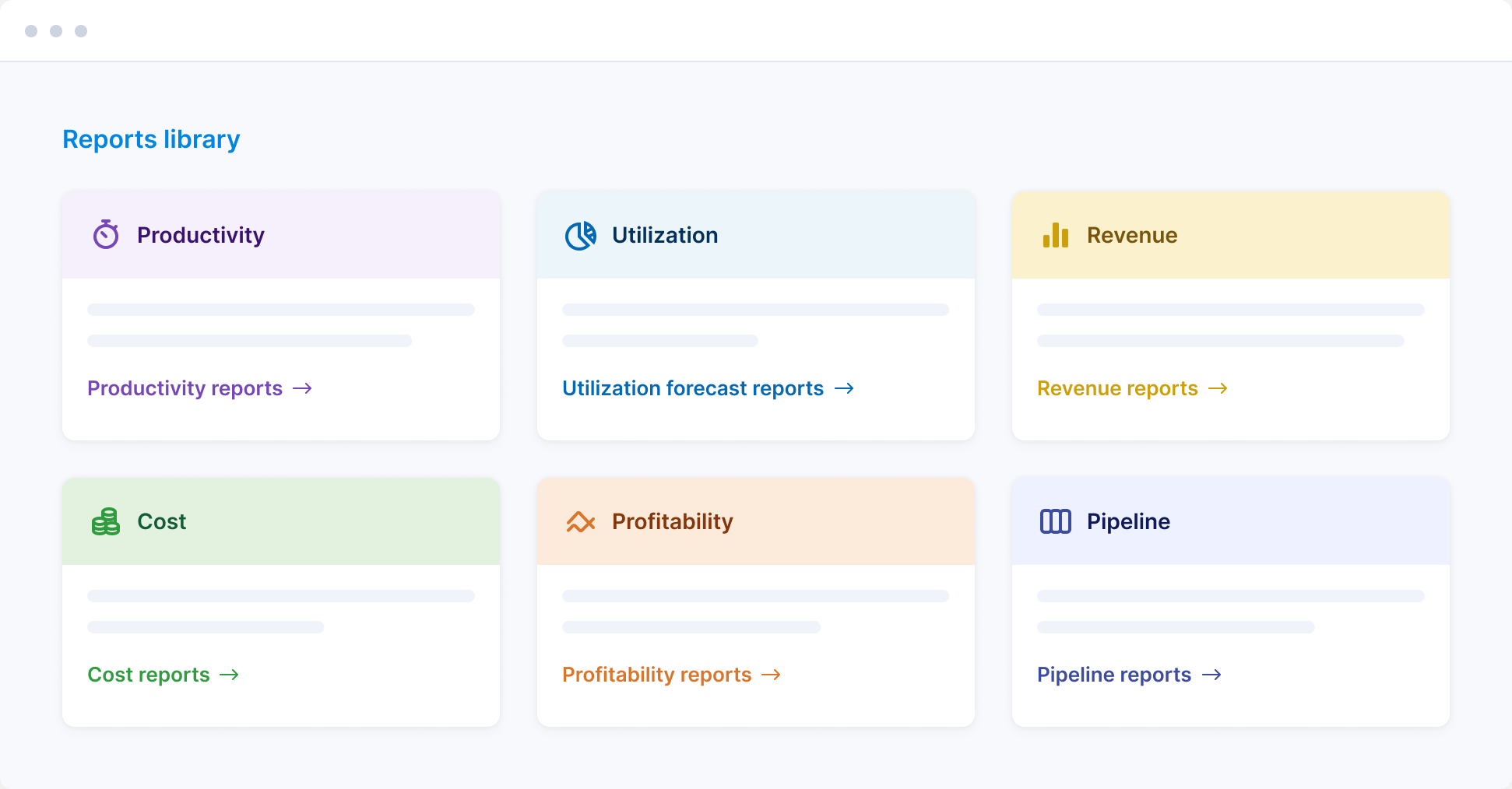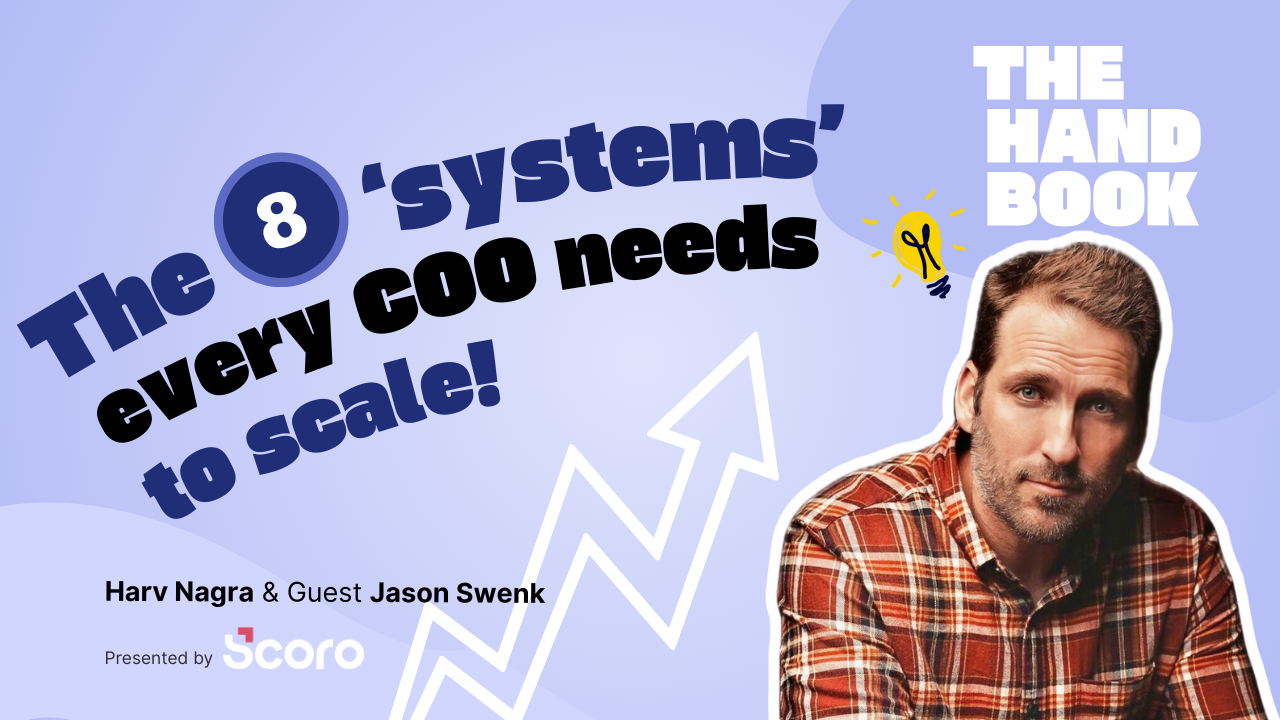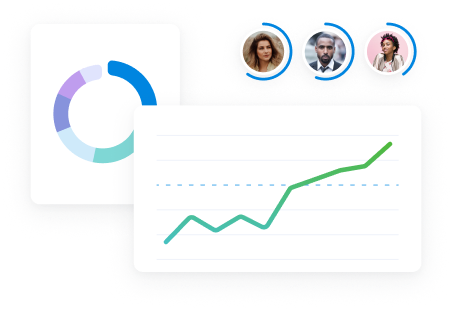Collaborate Global is a fast-growing brand experience agency with multiple offices worldwide serving global brands including Aston Martin, Audi, Hyundai, eBay, and Sky. The company was struggling with frequent visibility gaps for finance and delivery and had outgrown a toolchain of WorkflowMax, Smartsheet, Float, Xero, and spreadsheets. As the team scaled, the disconnect between siloed tools made margin control and reporting increasingly difficult and manual.
With Scoro, quoting, budgets, time, supplier bills, POs, and invoicing sit in one system. Teams get live profit and budget health, standardize their quoting, and – critically for Collaborate – run multi-entity operations with Xero sync, inter-office billing and multi-currency support centered on a single source of truth.
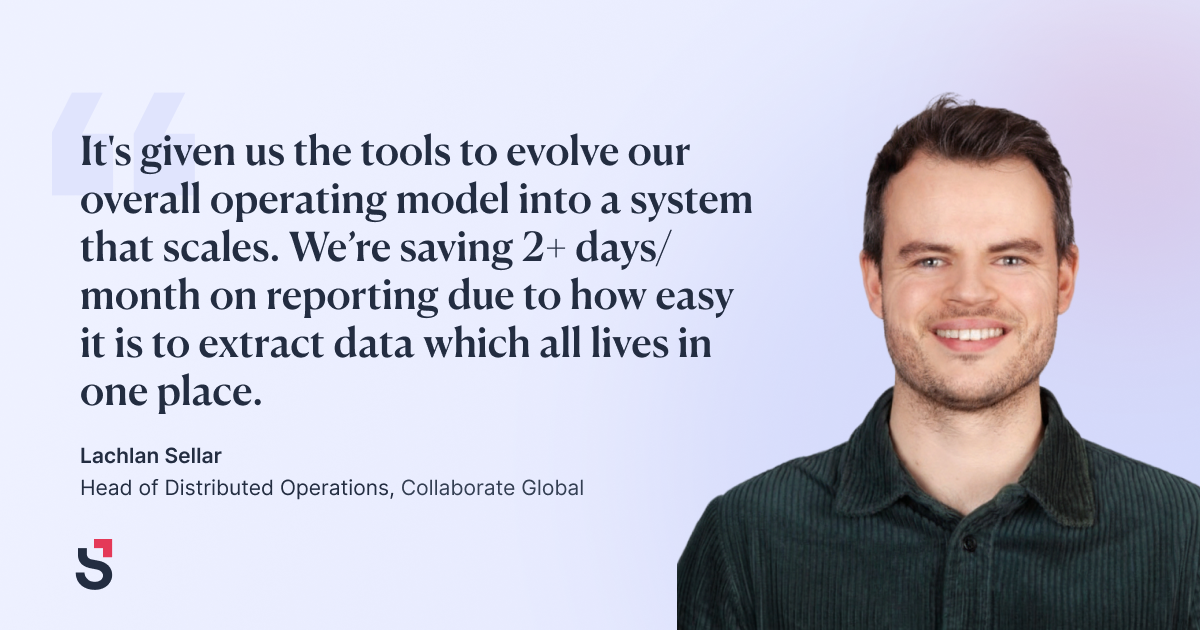
| Overview | Description |
|---|---|
| Company | Collaborate Global |
| Industry | Brand experience agency |
| Size | 75 employees |
| Location | Multi-entity with HQ in the UK |
| What they use Scoro for | Quote & budget management, project control, resource planning, invoicing, reporting, Xero integration |
| Impact (numbers) | 2+ days/month saved on reporting Project reconciliation down to days from weeks |
| Impact (what changed) | Standardized quoting, real-time budget tracking, faster and more accurate project reporting, earlier hiring/freelancer planning, actionable utilization |
Before and After Scoro
Before Scoro, Collaborate Global was using a range of systems to run its daily operations:
- WorkflowMax and Excel for quoting and budgeting
- Smartsheet for task management
- Excel for reporting
- Xero for accounting
In 2024, Collaborate Global decided to transition to Scoro to gain better visibility of the agency’s profitability and standardisation of quoting and pitching processes.
Here’s a snapshot of what they were able to achieve:
| Before | After | |
|---|---|---|
| Quoting | Budgets were free-typed in Excel and WorkflowMax, spreadsheet reliance slowed approvals and created errors. | Standardised, consistent quoting. Real-time budget visibility from quote forward and easier way to forecast profitability. |
| Resource Management | It was difficult to plan workload across teams, which often led to over-servicing and missed deadlines. | Utilization figures are measurable and actionable. The team can confidently plan hiring or freelancer needs earlier. |
| Project Management | It was hard to keep track of tasks and deadlines. Overservicing and scope creep was common. | Projects are being followed in detail from the quoting stage up to the end. Project progress tracking now exists in real time. |
| Time Tracking | Time was tracked in WorkflowMax; easy to hide and move hours around. | Improved timesheet hygiene; granular visibility of where all time goes. |
| Invoicing & Finance | Reconciliation across systems created lag and finance visibility suffered. | Reconciliation time moved from weeks to days or even hours as all financial workflows originate in Scoro. |
| Reporting | Fragmented reporting and manual reconciliation, the team was often behind. | Project reporting is faster and more accurate, saving the team 2+ days/month preparing reports. |
Tech Stack & Processes – why the previous setup wasn’t working
Before: A fragmented toolchain created blind spots
Previously, WorkflowMax handled jobs and budgets, Float managed resourcing, Smartsheet covered tasks, Xero ran financial ops, and Excel bridged gaps for building budgets and reporting. Budgets were crafted in Excel, then manually re-entered into WorkflowMax, with every subsequent change duplicated across systems, which increased error risk and stale data.
After: One source of truth with Scoro
During the evaluation, Scoro quickly stood out as the best fit: it had everything Collaborate needed, was intuitive to use right away, and could support the business as it scales.
Scoro became Collaborate’s single source of truth from quote to cash: it holds the entire project record, drives budgeting and client-ready proposals, and ties time, supplier bills, and invoicing into real-time project profitability and reporting.
It’s an extremely powerful tool. The value you get out of it is only limited by your agency’s ability to upgrade your ways of working. This isn’t a ‘use for two years and rip-and-replace’ platform. It can be a challenge to transition to, but that’s because it prompts you to start thinking and operating as a more mature business.
Quoting & Budgeting
Before: Unfit quote structure and spreadsheet work
Before, budgets and quotes were free-typed in spreadsheets and WorkflowMax. Lack of structured data meant each quote only worked for that one quote. Quote formats couldn’t easily show subtotals and sections, and approvals required manual controls. As actuals and change orders arrived, the team had to manually update data “in two different spots,” which often did not happen.
After: Standardized quote templates and reduced friction
Moving from “free-typed” quotes to a service/product catalog has driven uniformity and quality control, producing insights on where money goes and which suppliers to partner with. Scoro lets Collaborate map every line to a task or PO on quotes that can reach 100+ line items. Quotes and budgets now live together with configurable approvals. Teams use standard quote templates, can duplicate work, create sleek and detailed client-facing proposals, and route quotes for approval before sending.
It’s the most advanced quote-building process we saw. The way quotes then feed into a project is very powerful. It forces you to think about your project in detail from the quoting stage at the beginning right through to the end.
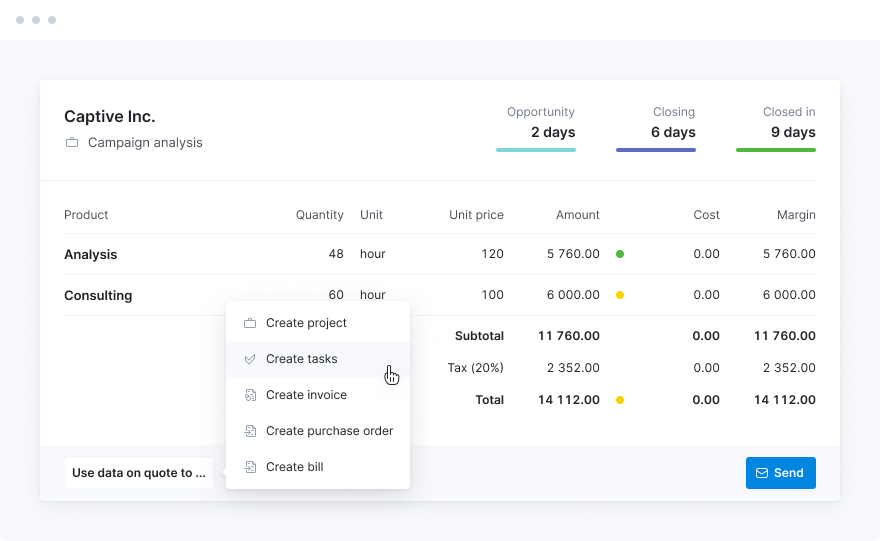
Resource Management
Before: Guesswork-driven resource management
Previously, resourcing and time tracking were disconnected from each other. While resourcing was handled in Float, time tracking lived in WorkflowMax, limiting the team’s visibility into how much new work they could take on. The team manually juggled planned vs. actual hours, limiting confidence in capacity decisions.
After: Unified capacity view in Scoro
Capacity & utilization reporting and forward-looking heatmaps within Scoro allow to see how utilized the team is and plan hiring and freelancer needs early. Bookings and workload views are tied to time.
We didn’t know if we had the bandwidth to take on new work. We had no visibility into who was over- or under-booked and there was too much reliance on a few key team members. Now, our team utilization is more measurable and actionable and we can confidently plan hiring or freelancer needs earlier.
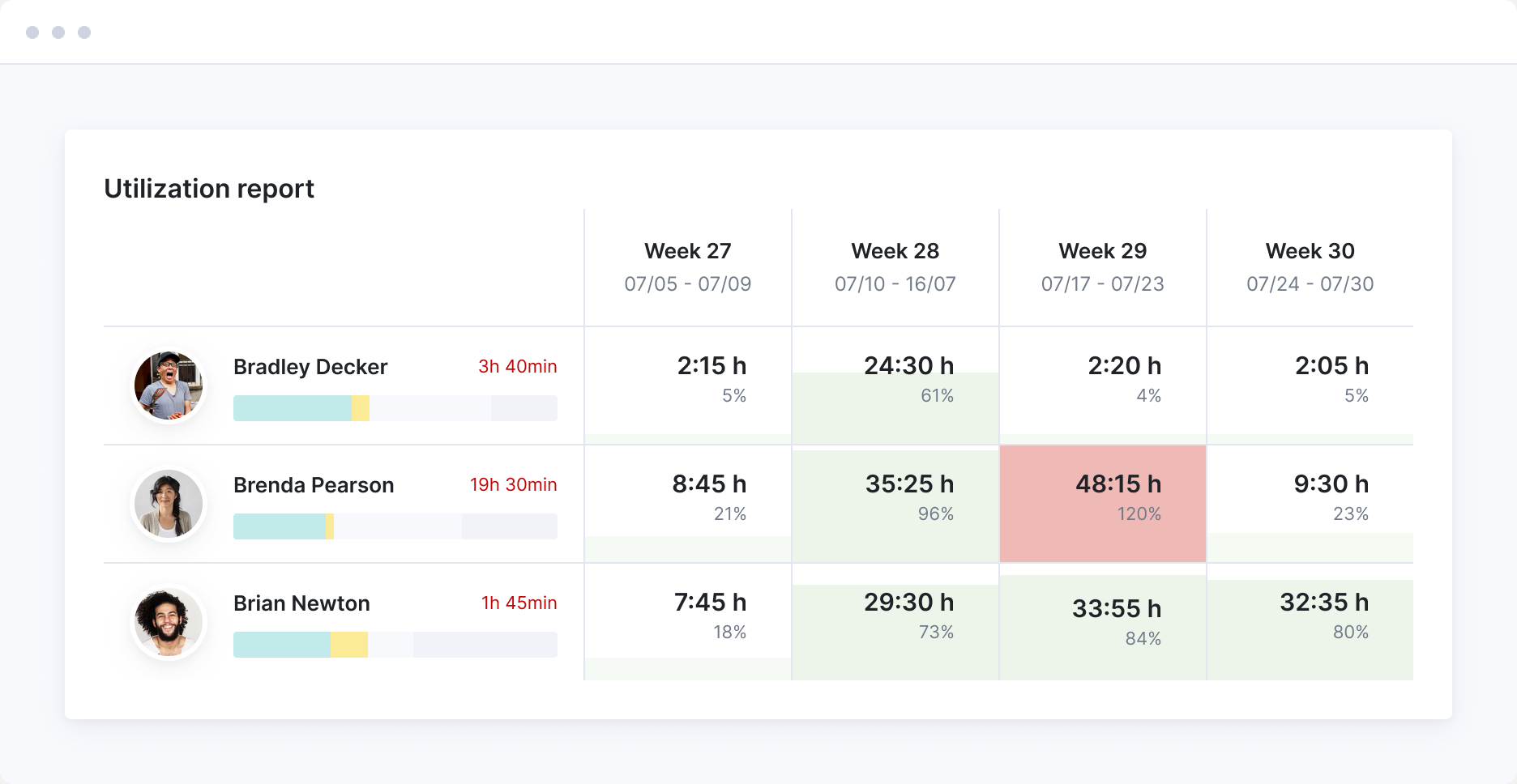
Project Management
Before: Limited visibility into project progress
The previous workflow made it clunky to compare actuals to budget and to spot over- or under-servicing. There was no real way to facilitate the approval process and any change order requests that might come through at a later time. As a result, visibility was increasingly limited as projects progressed and scope creep was common.
After: Live project profitability data
Now, the project progress is tracked in real time. Scoro acts as a single project hub showing targets, actuals, labor and supplier bills, with profitability updated in real time. Teams can track quote vs. actuals down to line items and avoid overservicing.
Live budget tracking is the biggest win. We can see well ahead of time whether a project’s on track and intervene early. It’s a very powerful tool that prompts you to manage projects the right way.
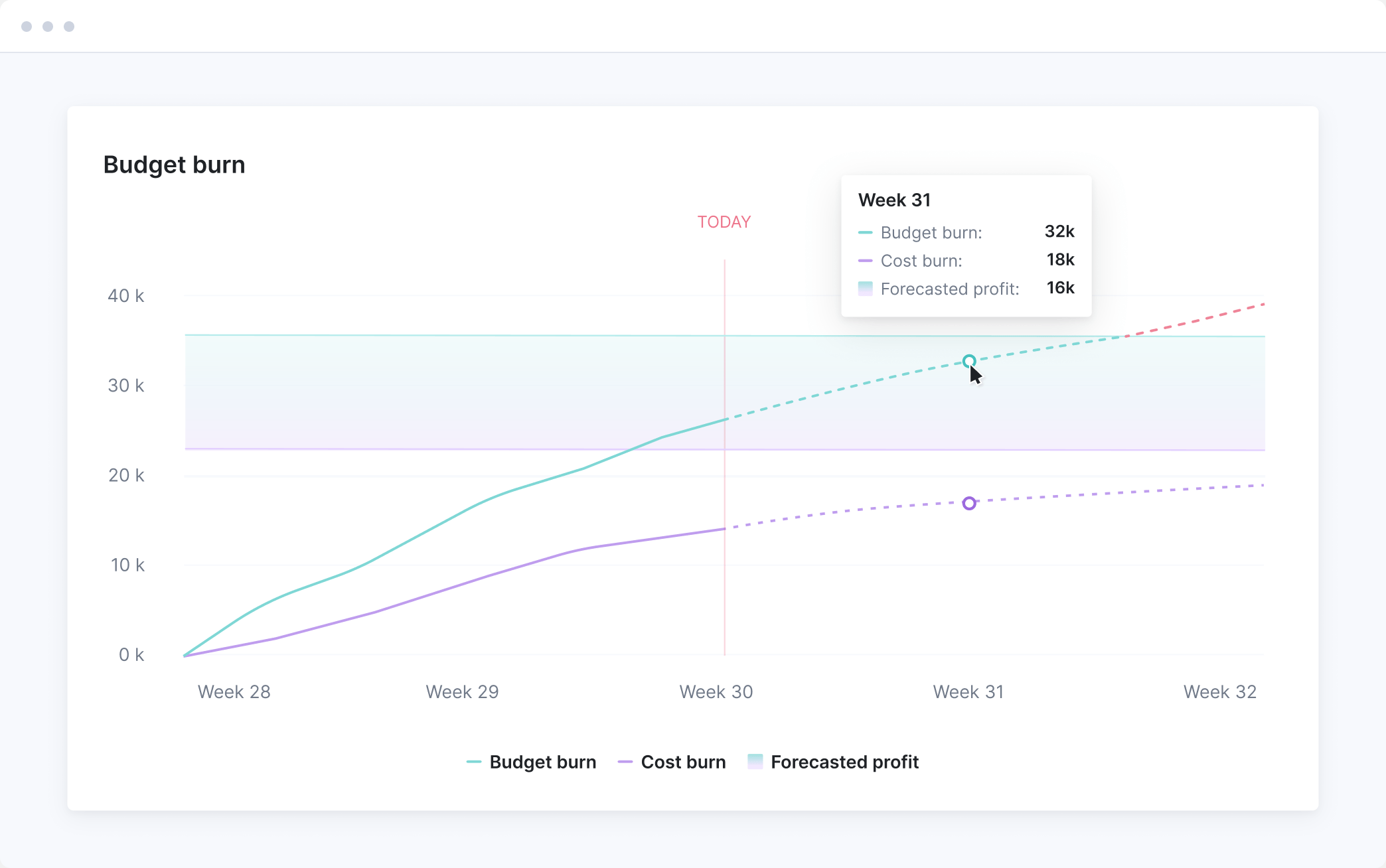
Time Tracking
Before: Old system made it easy to lose the project truth
In WorkflowMax, limited controls and low granularity meant hours could be shifted or poorly attributed. Time often appeared in the wrong place, projects looked healthier than they were, and leaders could not see where time actually went.
After: Transparent, task-level visibility that improved timesheet hygiene
With Scoro, execs can see where all time goes on every task because every entry is linked to a project and task. Timesheet hygiene has improved a lot – giving management the confidence to use time data for forecasting, profitability, and resource decisions.
We can see where all time goes. We’re much better at time tracking since moving to Scoro.
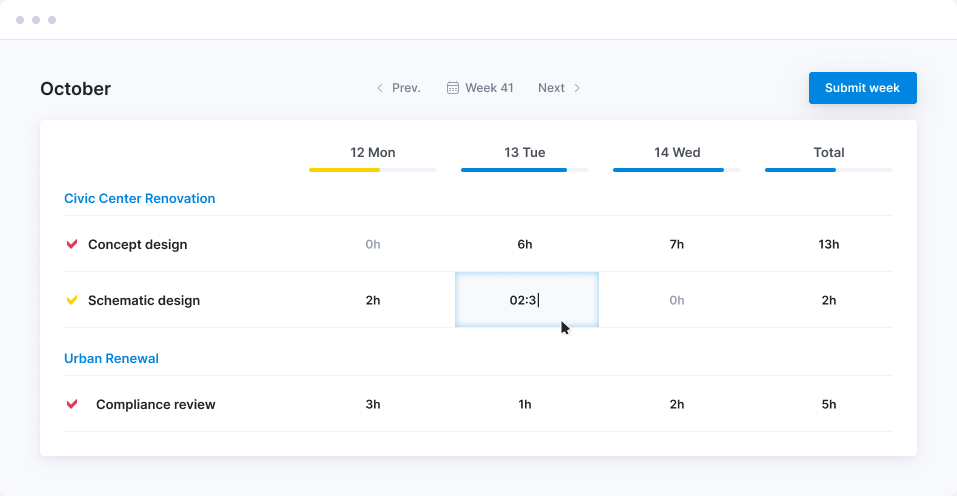
Invoicing & Finance
Before: Poor visibility into finance
Reconciliation across systems created lag and finance visibility suffered. The team was having trouble understanding profitability across entities and inter-office billing and considering investing in a more advanced finance management system.
After: Clean multi-entity invoicing
For multi-entity operations with inter-office billing and multi-currency, Scoro’s data model negated the need to buy a more advanced finance system. Reconciliation time moved from weeks to days or even hours as data lands in the right box during delivery.
Scoro has become our source of truth, all financial workflows start in Scoro and then sync to our finance system. It’s really helped us streamline and centralize our tech stack when it comes to reporting across entities. And it means that the finance system can just be used to do what a finance or an accounting system is meant to do.
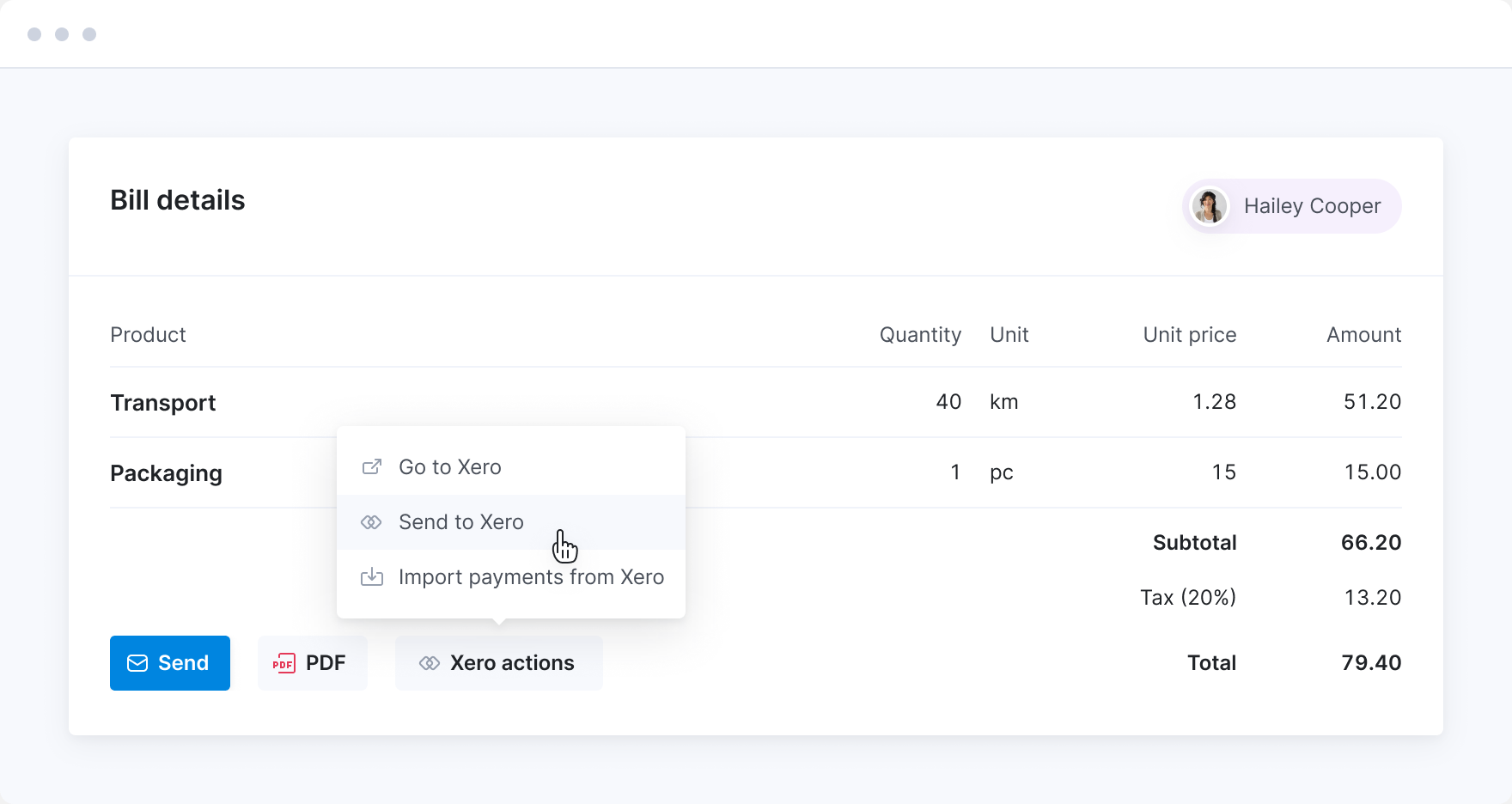
Reporting
Before: Fragmented, manual reporting
The old system had limited, fragmented reporting. The old approach relied on free-typed quoting in spreadsheets/WorkflowMax, which didn’t feed any intelligence into the project or portfolio. Because of that, leaders had to reconcile multiple sources and still lacked a real-time view of profitability, revenue, or over/under-servicing.
After: Centralized view and flexible timeline control
Scoro now holds the entire delivery record – quotes, budgets, time, supplier bills/POs and invoices – so teams get live WIP, revenue and project profitability in one place.
Crucially, Collaborate also pipes Scoro data into their external data warehouse and blends it with CRM and finance data to answer more complex questions and build custom board-level views. In practice, Scoro is the system of operational truth, and its clean data model powers both in-app dashboards and warehouse-driven BI.
It’s given us the tools to evolve our overall operating model into a system that scales. We’re saving 2+ days/month on reporting due to how easy it is to extract data which all lives in one place.
